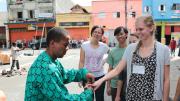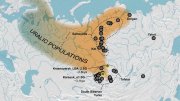It’s approaching noon in São Paulo, Brazil, and steps from the symphonic theater in the center of this city of 20 million, a squatter settlement is being razed and hundreds of people are being forced from their ramshackle homes. The area, rife with crack-cocaine use and poor health, lies in the heart of Brazil’s largest city, a very visible public-health problem.
Perhaps most out of place is a group of 15 Harvard students, dressed in clean clothes and engaged in translated conversation with locals curious enough to chat. The students want to gauge the community’s response to this heavy-handed measure. It’s been in the headlines for weeks: the city is launching a program called ‘Open Arms’ that will provide housing, meals, and treatment to displaced residents in exchange for community service and a small allowance. What will the ramifications be of a bold and contentious plan to treat a largely homeless population suffering from tuberculosis, AIDS, and mental-health issues?
The students—some from the College and some from Harvard School of Public Health (HSPH)—are in São Paulo, Brazil on an intensive three-week course for credit that takes place during the “J-term” to learn how the world’s fifth-largest country dispenses healthcare. After a week of classroom discussions and preparations, the students embark on site visits to shantytowns, infectious-disease hospitals, and mental-health clinics, then head back into the classroom for a discussion with 15 of their Brazilian peers and a group of physicians, researchers, and policymakers. The entire U.S. group also heads out to the field to embed themselves with mosquito-control teams, TB social workers, and community-health teams as they make their rounds.
“To go into the field and get a perspective on the international health issues from within the country itself was very valuable,” says Charles Upton, a master’s student in public health who was part of the January group. “The experiential nature is pretty powerful.” He hopes to apply what he’s learned to a future career in public health, something many course alumni have done.
“The course was basically the initiation of a series of professional and personal opportunities,” reports Amelia Rock, who took the course in 2008. She returned to Brazil the following summer to work on a thesis on HIV epidemiology that won her the award for best master’s thesis from HSPH’s department of global health and population. When she later joined John Snow Inc., a public-health consulting and research company, she was posted to Brazil for another year because of her experience and language abilities.
Immersing public-health students in the issues facing developing countries around the globe is an education model that’s growing. The didactic benefits of this immersion-based approach are palpable. Indeed, HSPH’s dean and Mexico’s former health minister, Julio Frenk, has championed the model, dubbing it part of a ‘globalized curriculum’ in public health. Similar courses have been replicated by universities and organizations around the world. “The experience is enlightening, provocative and memorable,” says Michael Reich, a professor at HSPH who organizes a similar January course held in Mexico. “Students come to understand the complexities of trying to implement health policies in the real world, forcing [them] to rethink conventional wisdom.”
There has been some pushback nationally to this hands-on approach. Some educators worry that students may be engaging in clinical practices in which they are untrained or heading abroad without supervision. Tricia Todd, an instructor in public-health practice at the University of Minnesota’s School of Public Health, cites stories of students delivering babies or suturing up patients and declares, “We need to be careful and check our attitude, our perceptions, our perspectives, and our biases before we participate in learning abroad. Even in public-health activities, we need to be mindful of unintended consequences.”
The HSPH Brazil course, certainly, is carefully planned, and the students benefit from professional mentoring daily during the three-week curriculum. A student interested in HIV, for example, has access to doctors at the infectious disease hospital, HIV researchers at Brazil’s top universities, social workers as they perform their rounds, and patients in the field and in the hospital wards.
“The course relies on field and personal experiences as a learning tool,” says HSPH associate professor of demography Marcia Castro, a Rio de Janeiro native who has directed the Brazil course for the last two years and participated since 2009. Castro maintains that the experience is unparalleled in giving students the chance to observe in the real world the theories and concepts learned in class. “It is ultimately informing the students’ careers.”
That belief is reflected by both American and Brazilian alumni of the program. Doug Pugliese, who participated in 2009, is now a dermatologist and professor at the University of Pennsylvania. His career has been punctuated with immersive public-health programs—he’s traveled to Botswana as a dermatology resident and to Iraq as a physician with the U.S. Navy. He says the experience he’s gained seeing public-health issues on the ground in Brazil and around the world has informed his practice. “I was able to translate that work when I went into residency in dermatology.”
Cesar Barros, an infectious-disease physician at the University of São Paulo who participated in 2012, commends the program for emphasizing a multidisciplinary approach that brings together students, physicians, and health officials to formulate innovative approaches to solving public-health problems. “We are used to having philosophical and heated discussions on how to overcome the bottlenecks of public health,” he says, “but we often forget to look for what is happening in the details in the field.”
Aleszu Bajak is a journalist and current Knight Science Journalism Fellow at the Massachusetts Institute of Technology. He recently spent three weeks in Brazil with support from the Knight program and the Harvard Global Health Institute. His writing can be found at aleszu.com.









